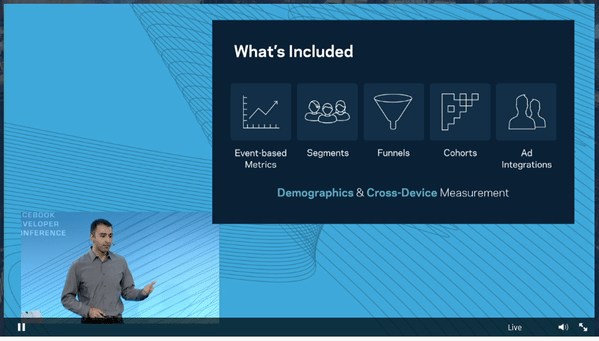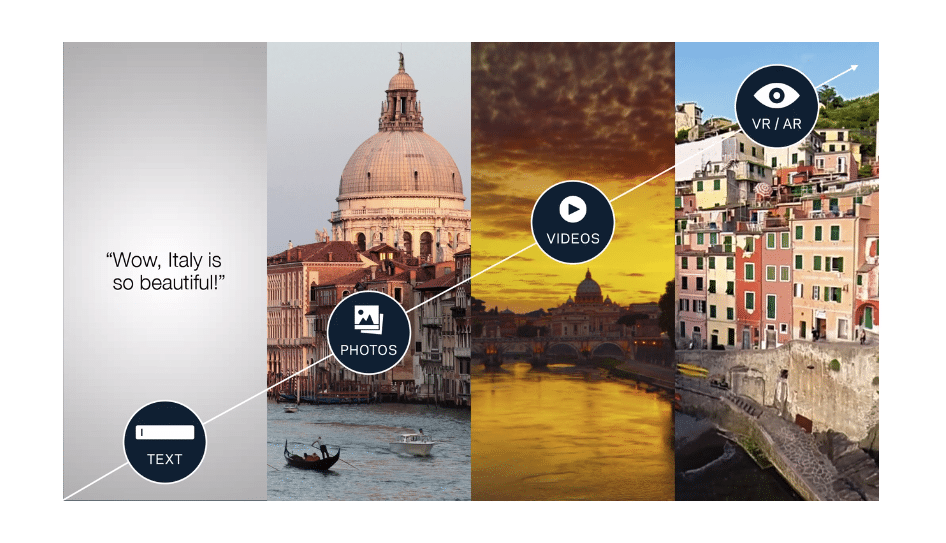Skift Take
Facebook is focusing its laser on Messenger and third-party app partnerships to retain and monetize its audience.
Facebook’s massive developer team unveiled a motherload of features that simultaneously affect users and travel brands at its annual conference yesterday.
Among other big ideas, CEO Mark Zuckerberg talked about the company platform’s stability by fixing more bugs in lesser time, an emphasis on putting a user’s security first, and Facebook’s connectivity crusade with its family of apps — Facebook Messenger, Groups, Instagram, and WhatsApp.
Facebook also provided more transparency on how it is leveraging both technology and human interaction to prioritize and de-prioritize posts in users’ News Feeds. The product team closed this topic with best practices on optimizing content: have a voice, provide context, and be timely.
There are 25 products that will be rolling out in coming weeks, and here are three key topics that will have a strong impact on travel brands:
Extending Live Chat to Businesses on Messenger
A partnership with Zendesk’s connects shoppers in the checkout process in online stores with customer service through Facebook Messenger, where the live chat is hosted and requests managed.
This integration will provide airlines, hotels, and booking sites the ability to manage customer inquiries in a direct message that is more timely and personalized. In addition, it unifies the customer’s online and social identity.
There are 600 million monthly active users on Facebook Messenger, and brands are trained to be where the users are. Daniel Moriarty, director of social strategy at Hyatt Hotels & Resorts said, “Technology developments like Facebook Messenger provide more opportunities to build on the real-time, 24/7 model we have already established to allow our colleagues to lend a helping hand, pass on useful information or create better, more personalized experiences for our guests worldwide.”
From a tourism board that has Zendesk product experience, “The challenge is most DMOs still have very small social media teams. The key I guess will be how it [Businesses on Messenger] will help organize the high volume of enquires most DMOs normally get,” said Jesse Desjardins, social media and advocacy manager at Tourism Australia.
Supporting New Video Content and Distribution
On the topic of communicating with visual content Zuckerberg said, “We’re starting to see traditional video blend with more immersive content.” He illustrated this by showing how Italy could be experienced as a destination in four different ways, from text, image, video, to spherical video. The progression of the visual experience from 2D to 3D on News Feed will spoon-feed familiarity with virtual reality — handy considering Facebook’s Oculus Rift ownership. Travel-related moments will continue to provide deep inspiration for this new medium.
Being able to embed videos that are directly uploaded to Facebook outside of the platform is a huge incentive for brands to publish more videos. This new product is an extension of Facebook’s social plugin where interactions — likes, shares, comment, etc. — are unified between Facebook and the web page. There are no plans for monetization on embedded videos at this time, however monetization of videos on News Feed desktop and mobile is possible with its partnership with LiveRail.
Tourism Australia’s wildly successful Facebook video of a photo-junkie quokka gained 6.7 million video views, 683,075 likes, 174,886 comments, and 141,387 shares last week. Skift reached out to them and at this time, they are still looking into the implication of the Embedded Video Player for their team and reserved comments.
App Integration and Analytics
During the conference, Facebook featured Orbitz’ baggage claim push notification powered by Parse — an app optimization platform and app analytics company acquired by Facebook in 2013. Ryan Kowalcyzk, senior director, product at Orbitz talked the importance of Parse’s technology, “It makes it easier to be on both platforms [iOS/Android].”
These notifications are extended to smart watch users that enable Parse’s technology to be applied to other smart devices. Kowalcyzk claimed that 70% of Orbitz air bookers have opted-in to push notifications that alerts flyers about flight delays, gate changes, etc. and between 5,000 to 10,000 push notifications are sent per day to mobile app customers and smart watch users. Parce and Facebook have their hands in the ‘Internet of Things’ and this platform will breed new devices and solutions that will aim to provide ‘connected conveniences’ for travelers.
Deep linking of conversational apps — like Giphy and JibJab — to Facebook Messenger App gives users new ways to express themselves as third-party developers build new apps on top Facebook’s platform. “As long as they go from gimmicky to utility quickly, I think it’ll stick,” said Hyatt’s Moriarty. “Question is how long will that take?”
With the flow of information from one device to the next, Facebook’s analytics for apps will provide a view into customer behavior and attribution data to better personalize the apps and market them to the right people. Travel brands that enable its app users to login via Facebook can access this dashboard for free.

Source: Facebook
The Daily Newsletter
Our daily coverage of the global travel industry. Written by editors and analysts from across Skift’s brands.
Have a confidential tip for Skift? Get in touch
Tags: facebook, hyatt, orbitz, tourism australia
Photo credit: Experiencing Italy from text to a spherical video perspective. Facebook / Facebook Newsroom
